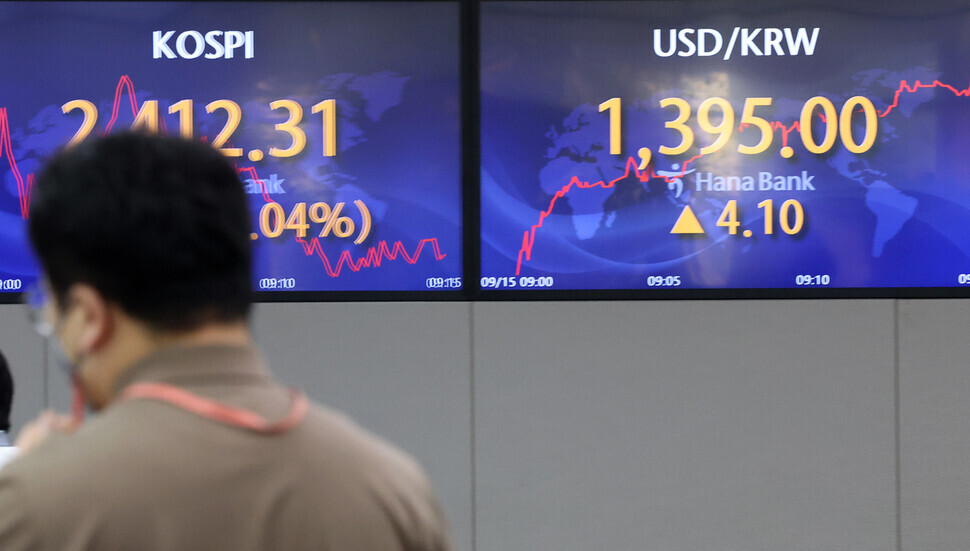hankyoreh
Links to other country sites 다른 나라 사이트 링크
Rising exchange rate raises alarm of dollar liquidity crunch in Korea

Tensions were high at the Seoul foreign exchange market for a second consecutive day on Thursday regarding whether the won-to-dollar exchange rate would breach 1,400 won.
Meanwhile, indications of unstable supply and demand for the dollar emerged in the foreign currency market, the source of the domestic dollar supply, during the four days following the Chuseok holiday as well. The foreign exchange swap point, which indirectly demonstrates the short-term liquidity conditions of the dollar, grew to -4.35 won on the same day, increasing the “premium” required to borrow in dollars.
The won-to-dollar exchange rate closed at 1,393.70 won at the foreign exchange market on Thursday, having risen by 2.80 won from the previous day. The exchange rate quickly broke the previous day’s record (1,395.50 won) and shot up towards the 1,400 won range during trading, reaching 1,397.90 won around 1 pm.
Authorities intervened by making various statements, Deputy Prime Minister and Minister of Economy and Finance Choo Kyung-ho stating that “appropriate market stabilization measures” would be devised in case of “excessive market imbalance or the spread of unease,” while foreign exchange authorities stated they would “monitor the situation closely while remaining cautious about the possibility of unevenness in the market.”
In fact, the exchange rate began to decline once the dollar was supplied into the market from the foreign exchange reserve.
Traders have called 1,400 won the “psychological line of resistance.” However, one analyst said, “1,400 won is simply a ‘big figure,’ and the foreign exchange chart up until now suggests the exchange rate can go up to 1,596.0 won (the high price during trading on March 2, 2009).”
So far, authorities have maintained that the foreign currency market, the source of dollar supplies domestic corporations and households use for payments and foreign investments, has remained stable even though the exchange rate has continued to surge due to the dollar’s strength globally.
However, according to the Korea Money Brokerage Corporation, which brokers short-term funds amongst financial institutions, the foreign exchange swap point for exchanges (three-month forward rate) hit -4.35 won on Thursday. The figure had increased on Tuesday (-3.20 won) as well as on Wednesday (-3.90 won).
A foreign exchange swap is an agreement between domestic and foreign commercial banks to borrow and lend each other dollars during a set time period. For example, Bank A may pay Bank B spot goods in won in exchange for spot goods in dollars, after which Bank A returns the dollar received to Bank B and vice versa on the due date.
The foreign exchange swap point, which is akin to an interest rate that changes every day between the parties involved, can be considered a “dollar premium” of sorts that should be paid to the other party when the dollar is being procured in the short term.
The rise of the swap point indicates that borrowing dollars from the domestic short-term foreign currency market may become more and more difficult while the dollar’s liquidity may worsen. An official at the foreign exchange market commented, “The skyrocketing exchange rate is starting to influence the foreign currency market.” They added, “Amidst the dollar’s strength globally, the dollar’s liquidity at foreign currency markets domestically and abroad is faltering.”
By Cho Kye-wan, senior staff writer
Please direct questions or comments to [english@hani.co.kr]

Editorial・opinion
![[Editorial] Penalties for airing allegations against Korea’s first lady endanger free press [Editorial] Penalties for airing allegations against Korea’s first lady endanger free press](https://flexible.img.hani.co.kr/flexible/normal/500/300/imgdb/original/2024/0502/1817146398095106.jpg) [Editorial] Penalties for airing allegations against Korea’s first lady endanger free press
[Editorial] Penalties for airing allegations against Korea’s first lady endanger free press![[Editorial] Yoon must halt procurement of SM-3 interceptor missiles [Editorial] Yoon must halt procurement of SM-3 interceptor missiles](https://flexible.img.hani.co.kr/flexible/normal/500/300/imgdb/child/2024/0501/17145495551605_1717145495195344.jpg) [Editorial] Yoon must halt procurement of SM-3 interceptor missiles
[Editorial] Yoon must halt procurement of SM-3 interceptor missiles- [Guest essay] Maybe Korea’s rapid population decline is an opportunity, not a crisis
- [Column] Can Yoon steer diplomacy with Russia, China back on track?
- [Column] Season 2 of special prosecutor probe may be coming to Korea soon
- [Column] Park Geun-hye déjà vu in Yoon Suk-yeol
- [Editorial] New weight of N. Korea’s nuclear threats makes dialogue all the more urgent
- [Guest essay] The real reason Korea’s new right wants to dub Rhee a founding father
- [Column] ‘Choson’: Is it time we start referring to N. Korea in its own terms?
- [Editorial] Japan’s rewriting of history with Korea has gone too far
Most viewed articles
- 160% of young Koreans see no need to have kids after marriage
- 2Presidential office warns of veto in response to opposition passing special counsel probe act
- 3[Editorial] Penalties for airing allegations against Korea’s first lady endanger free press
- 4Months and months of overdue wages are pushing migrant workers in Korea into debt
- 5Hybe-Ador dispute shines light on pervasive issues behind K-pop’s tidy facade
- 6Japan says it’s not pressuring Naver to sell Line, but Korean insiders say otherwise
- 7[Reporter’s notebook] In Min’s world, she’s the artist — and NewJeans is her art
- 8Inside the law for a special counsel probe over a Korean Marine’s death
- 9At heart of West’s handwringing over Chinese ‘overcapacity,’ a battle to lead key future industries
- 10OECD upgrades Korea’s growth forecast from 2.2% to 2.6%